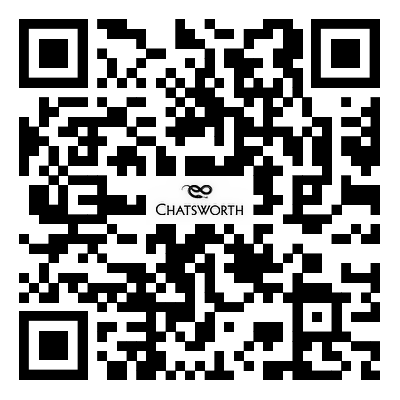Henry Cavendish (1731-1810) was a natural philosopher and the grandson of the 2nd Duke of Devonshire. His many achievements include the discovery of hydrogen, ascertaining that water was not an element but a compound of gases, and calculating the mass of the earth.
For centuries, evidence of Henry's remarkable genius has been preserved in the archive at Chatsworth, awaiting the time and financial resource that would enable it to be shared with researchers, academics and students across the world.
Thanks to the generous support of the American Institute of Physics, the Chatsworth House Trust charity has completed a 12-month project to catalogue Henry's papers and letters.
A total of 435 items that were previously uncatalogued have been added to the collection.
The collection consists of Henry Cavendish's scientific papers, his correspondence, his journals, his library catalogue and the "White Book": his only known notebook to survive. His scientific papers cover descriptions and explanations of experiments, preliminary research notes and data, figures and diagrams, analytical tables, drafts of Papers and Propositions, algebraic calculations, formulae and computations.
Thousands of other pieces of information have been compiled to give context and depth to the catalogue: dates, correspondents, biographies, locations, topics, diagrams, and cross-references to material in our other collections and elsewhere.
This level of detail aids researchers and will hopefully expand the scholarship into the life of this almost-famous scientist; proving he was not the cold, emotionless caricature envisioned by his Victorian biographers, but a person that had “no affections, but always meant well” (quote from the diaries of Sir Charles Blagden held at the Royal Society).
Accessing the catalogue
You can view the catalogue of Henry Cavendish's letters and papers on the National Archive's Discovery pages here:
or on the Archives Hub here:
If you are unfamiliar with an archive collection, the more user-friendly site is Archives Hub.
An archival collection is structured from the top-down: the first information that you will view gives you an overview of the whole collection. The side-bar allows you to access information about various sections of the collection, and then downwards to more specific information about individual items.
Accessing Henry Cavendish's collection
Access to any items in the Henry Cavendish collection, or in any other archival collection held by the Devonshire Collections, is free to researchers, academics and students in our Collections Study Room, located in Chatsworth House.
The study room is open by pre-booked appointment only from Monday to Wednesday.
Henry Cavendish: Blog Series
Throughout the project, archivist Erinna Cave shared her findings in a series of blogs.
Meet Henry Cavendish
An introduction to Henry Cavendish and a description of the task of archiving his papers, journals and instruments.
The Cavendish Experiment
An update including the first discovery of documentation related to his most famous experiment.
Henry's Other Interests
Project Archivist Erinna Cave discovers Henry Cavendish's wider interests and acquaintances, which included Duchess Georgiana.
A Quiet Genius: Summary
Erinna Cave signs off on the project to catalogue the papers and letters of Henry Cavendish, and summarises all we have come to know about him.
History of Chatsworth: Extended Family
A short overview of Henry Cavendish and his achievements.
The Chatsworth House Trust (registered charity 511149) is dedicated to looking after the house, collections, garden, parkland and woodlands for the benefit of everyone.
All income from ticket sales, Gift Aid, our Chatsworth Friends and Patrons programmes, partners, sponsors and funders goes directly to the charity and is reinvested in the upkeep, preservation and improvement of Chatsworth, our learning programme and essential conservation work.
Chatsworth holds an extensive archive that includes the personal papers of the Devonshire family, historically significant acquisitions, and estate and staff records. The charity funds the preservation, restoration and cataloguing of these papers, sharing the findings to advance our understanding of historical figures, events and places, and to make them available to anyone conducting research for academic or personal reasons. Find out more about our archives and library.
Learn more about Chatsworth House Trust, or make a secure online donation to support the work of the charity, using the links below.
About Chatsworth House Trust
Chatsworth House Trust is a registered charity established in 1981 to improve and maintain the house, collections, garden, woodlands and park for the benefit of everyone.
Support our Cascade Campaign
The Cascade has been delighting visitors to Chatsworth since 1696 but is now in need of urgent repair. Learn more about our fundraising campaign 'Celebrating the Cascade'.
Donate online
If you can, support us by making a one-off or regular donation to the Chatsworth House Trust charity online.
Chatsworth Friends
Support the work of the charity while benefitting from unlimited visits, free tickets to events and discounts on shopping, dining and stays.
Gift Aid
When you use Gift Aid, the government gives an extra 25% on top of your kind donation, in lieu of tax you have already paid. All of this money goes directly to Chatsworth House Trust.
Patrons of Chatsworth
Patrons play a vital role in supporting the long-term stewardship of Chatsworth and enjoy exclusive access to the collections and curatorial team via special events.
Film image credits:
Lady Anne Cavendish, Lady Rich (1612-1638) by after Sir Anthony Van Dyck (Antwerp 1599 - London 1641) ©National Trust Images
All from the Devonshire Collections, Chatsworth ©Chatsworth Settlement Trustees:
Henry Cavendish Portrait by Anonymous
Georgiana, Duchess of Devonshire (1757-1806), by Thomas Gainsborough, 1783
Lord Charles Cavendish (d.1783) by Enoch Seeman the Younger
William Cavendish, 7th Duke of Devonshire (1808–1891) by George Frederic Watts









